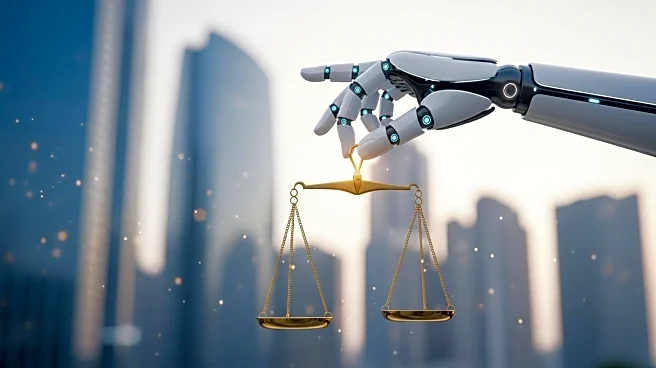What is the story about?
What's Happening?
Latham & Watkins has emerged as a leading law firm in mergers and acquisitions (M&A) involving artificial intelligence (AI) companies. According to a Bloomberg Law analysis, AI-related transactions have become a significant part of the legal industry's M&A work, accounting for over a quarter of deals valued at $5 billion or more this year. Out of nearly 90 such transactions, 23 involved AI companies directly or indirectly, either by responding to AI-driven power demands or providing services to support AI security, services, or infrastructure. Latham & Watkins advised on deals worth $110.5 billion, surpassing other major law firms such as Wachtell, Lipton, Rosen & Katz and Cleary Gottlieb Steen & Hamilton, which advised on deals worth $63.7 billion and $58.1 billion, respectively.
Why It's Important?
The prominence of AI in M&A transactions highlights the growing influence of technology on the legal industry and the economy at large. As AI continues to evolve, law firms are increasingly required to adapt to new technological demands, which can lead to significant shifts in legal practices and client services. The substantial involvement of law firms in AI-related deals underscores the importance of legal expertise in navigating complex technological landscapes. This trend may lead to increased demand for legal professionals with specialized knowledge in AI and technology, potentially reshaping the legal job market and educational requirements for future lawyers.
What's Next?
As AI technology continues to advance, it is likely that the number of AI-related M&A transactions will increase, further integrating AI into various sectors of the economy. Law firms may need to expand their technological expertise and resources to effectively manage these complex deals. Additionally, regulatory bodies may begin to scrutinize AI-related transactions more closely, potentially leading to new legal frameworks and compliance requirements. Stakeholders in the legal industry, including law schools and professional organizations, may need to adjust their curricula and training programs to prepare new lawyers for the challenges posed by AI technology.
Beyond the Headlines
The rise of AI in M&A transactions could have broader implications for privacy and cybersecurity, as companies involved in these deals may handle sensitive data and require robust security measures. Ethical considerations surrounding AI, such as bias and transparency, may also become more prominent in legal discussions, influencing how law firms advise their clients. Furthermore, the integration of AI into legal practices could lead to increased efficiency and innovation, potentially transforming traditional legal processes and client interactions.















